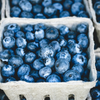What are the health benefits of wild blueberries

Reading time: 9 minutes
Not only delicious, organic wild blueberries from Lac-Saint-Jean are recognized as a more than judicious healthy choice! Why are wild blueberries so good for your health? Here are the five main benefits you can get by eating more blueberries.
First, say thank you to antioxidants !
It is the antioxidants present in plants that help neutralize and slow down the damage caused by free radicals . Free radicals come from the normal activity of your system, which should naturally regulate them. On the other hand, when you are more exposed to pollution and the sun, free radicals can damage the cells present in your body.
This oxidation phenomenon contributes to the premature aging of the body and the organism. Consuming antioxidants on a regular basis would prevent many diseases such as cancer, cardiovascular disorders, infections and premature aging.
Fortunately for us, the wild blueberry from Lac-Saint-Jean comes out on top of the ORAC (Oxygen Radical Absorbance Capacity) index of foods with antioxidant effects.
Indeed, wild blueberries from Lac-Saint-Jean contain a lot of anthocyanin, a flavonoid (member of the polyphenol family) that has a powerful antioxidant capacity. It is also this antioxidant that gives blueberries their dark blue color and that makes this superfruit have many benefits for our health that I present to you in this article.
Benefit #1 – Blueberries help your brain health.
You are concerned about the health of your brain and the quality of your memory ? Know that wild blueberry helps improve cognitive functions and slow down the deterioration caused by time.
For many years, researchers have been interested in the effects of blueberries on the cognitive function of the brain. Current research suggests that regular consumption of blueberries may improve short- and long-term memory.
It would also promote better attention, an improvement in visuospatial memory and it would seem to slow the development of cognitive problems due to aging, such as Alzheimer's disease or dementia [1,2].
These beneficial effects are thought to be attributable to antioxidants that reduce damage to cells caused by oxygen (premature aging of cells) and help make neurons more efficient while increasing the generation of new nerve cells.
Benefit #2 – Blueberries are great for your eye health.
Are you concerned about the health of your eyes? ? Here's how wild blueberries contribute to their health.
The story goes that during World War II, British Army pilots ate blueberry jam (a close cousin of the wild blueberry from Lac-Saint-Jean) to improve their night vision in order to better fight German planes at night.
What does science say about this? Current research does not support the conclusion that it improves night vision. Some historians believe that the British military spread this rumor for the sole purpose of distracting the Germans while they were testing their new radar system [3].
Beyond this anecdote, more and more research confirms that blueberries could be beneficial for your eye health for several reasons.
It protects your eyes, especially the retina, from the harmful effects of the sun and oxygen. Regular consumption of wild blueberries would help limit the progression of macular degeneration, cataracts and myopia [4].
Blueberries also help to strengthen collagen (a protein that supports healthy connective tissues) and could therefore help prevent and treat glaucoma, a disease caused by excessive eye pressure and diabetes.
Benefit #3 – Blueberries are rich in vitamins and minerals, great for your overall health.
Rich in vitamin A, C, K and iron, its regular consumption is the best vitamin supplement.
Blueberries are considered a superfood, especially because they are high in antioxidants, but also because they contain vitamins A, C and K, iron and manganese.
Rich in vitamin A, blueberries (as well as carrots) are often cited for their ability to improve night vision. The vitamin K present in blueberries is the vitamin that helps your blood to clot. It also helps to preserve the health of bone tissue. Manganese, for its part, would contribute to maintaining the good health of your bones.
The presence of iron in blueberries also helps improve your energy status. It is used in particular to transport oxygen to tissue and muscle cells, to facilitate reactions within cells and to defend the body (indirectly) against infectious diseases. The benefits of vitamin C are already well known: it promotes the absorption of iron in the body, wound healing and acts as an antioxidant.
This little fruit is a real cocktail of vitamins and minerals. Ideal for your overall health.
Benefit #4 – Blueberries improve your digestive health.
Low in calories, improves blood sugar control and helps you better control your weight, this little treasure from Lac-Saint-Jean should be included in your diet if you want to improve your digestive health.
Blueberries are a very low calorie fruit.
Blueberries are 85% water and are arguably one of the best fruits to control your calorie intake due to their low energy content (45 cal. per 100 g). Half a cup of fresh blueberries would only contain 11 grams of carbohydrates, which is not much. This is the equivalent of 11 minutes of cleaning or 4 minutes of running [5]. It is a healthy snack to enjoy!
Blueberry helps control blood sugar
Research conducted by Yves Desjardins, full professor and researcher at the Faculty of Agricultural and Food Sciences at Laval University, shows that blueberries act as probiotics, which helps improve the health of the intestinal flora, which in turn improves blood sugar regulation and reduces weight gain in the context of a diet high in fat and sugar [6].
According to the work of another team of Canadian researchers [1] , blueberries also have the ability to stimulate insulin production by regenerating pancreatic cells [7]. Better insulin production helps regulate blood sugar and helps people with type 2 diabetes.
Wild Blueberry Helps with Weight Control and Loss
Another variety of antioxidants, catechins (found in tea) are thought to increase our energy expenditure (burn more calories) which would promote weight loss.
The catechins in blueberries can activate genes that help us lose weight, especially the fat around the abdomen (which is particularly bad). In fact, a recent study showed that subjects who frequently consumed foods and drinks with catechins lost 77% more abdominal fat than those who didn't [8].
Blueberries fight constipation
Blueberries also fight constipation since they contain four grams of fiber per serving. This is ideal for helping you improve your digestive health.
Benefit #5 – Wild blueberries, excellent for your mood !
Beyond the simple joy of picking them in the fields and then savoring them, more and more studies show that eating wild blueberries improves your mood.
A recent study [9] carried out in 2017 by British researchers showed that the consumption of wild blueberries would help to improve the mood of young people aged between 7-10 and 19-21 years old.
Both groups were asked to consume either a wild blueberry drink or a placebo. Participants rated their mood before and two hours after consumption. The results of this experiment show that participants reported a significant improvement in their mood after drinking the blueberry drink.
Epidemiological research [11,12,13,14,15] has also shown that regular consumption of flavonoids (antioxidants present in blueberries) throughout life is associated with a lower risk of depression later in life.
A possible explanation for this benefit would be related to flavonoids. These would increase blood flow to the brain, which would allow better cognitive control and better regulation of mood [10].
REFERENCES
For a complete directory of studies and research conducted on wild blueberries, we invite you to consult the directory of the Wild Blueberry Association of North America [ link ].
- http://www.ars.usda.gov/research/publications/publications.htm?seq_no_115=203302
- http://www.radio-canada.ca/nouvelles/Santeeducation/nouvelles/200505/03/001-bleuets-alzheimer.shtml
- https://www.mcgill.ca/oss/article/nutrition-you-asked/it-true-bilberries-are-good-eyes
- https://www.selection.ca/sante/prevention/les-bleuets-et-leurs-bienfaits-sante-sur-les-yeux/
- https://www.topsante.com/nutrition-et-recettes/les-bons-aliments/les-supers-aliments/la-myrtille-prend-soin-de-nos-yeux-620584
- https://www.selection.ca/sante/prevention/les-bleuets-et-leurs-bienfaits-sante-sur-les-yeux/
- https://www.passeportsante.net/fr/Actualites/Nouvelles/Fiche.aspx?doc=2006111018
- https://www.canalvie.com/recettes/meilleures-recettes-bleuets-1.3045749
- https://www.ncbi.nlm.nih.gov/pmc/articles/PMC5331589/pdf/nutrients-09-00158.pdf
- https://www.neomedia.com/saguenay-lac-st-jean/actualites/actualites/308389/une-nouvelle-etude-revele-les-bienfaits-potentiels-des-bleuets-sauvages-sur-lhumour#:~ :text=A%20new%20%C3%A9study%20british%20published%C3%A9e,young%20adults%20and%20of%20children.
- Chang SC, Cassidy A., Willett WC, Rimm EB, O'Reilly EJ, Okereke OI Dietary flavonoid intake and risk of incident depression in midlife and older women. Am. J. Clin. Nutr. 2016;104:704–714. doi:10.3945/ajcn.115.124545. [ PMC free article ][ PubMed ] [ CrossRef ] [ Google Scholar ]
- Mihrshahi S., Dobson AJ, Mishra GD Fruit and vegetable consumption and prevalence and incidence of depressive symptoms in mid-age women: Results from the Australian longitudinal study on women's health. Eur. J. Clin. Nutr. 2015;69:585–589. doi: 10.1038/ejcn.2014.222. [ PubMed ] [ Crossref ] [ Google Scholar ]
- Bondonno CP, Downey LA, Croft KD, Scholey A., Stough C., Yang X., Considine MJ, Ward NC, Puddey IB, Swinny E., et al. The acute effect of flavonoid-rich apples and nitrate-rich spinach on cognitive performance and mood in healthy men and women. Food Function. 2014;5:849–858. doi:10.1039/c3fo60590f. [ PubMed ] [ Crossref ] [ Google Scholar ]
- Bouayed J. Polyphenols: A Potential New Strategy for the Prevention and Treatment of Anxiety and Depression. Curr. Nutr. Food S ci. 2010;6:13–18. doi:10.2174/157340110790909608. [ Crossref ] [ Google Scholar ]
- Pase MP, Scholey AB, Pipingas A., Kras M., Nolidin K., Gibbs A., Wesnes K., Stough C. Cocoa polyphenols enhance positive mood states but not cognitive performance: A randomized, placebo-controlled trial. J. Psychopharmacol. 2013;27:451–458. doi:10.1177/0269881112473791. [ PubMed ] [ Crossref ] [ Google Scholar ]
-
Posted in
bienfaits, bleuets et bienfaits, santé





Le bleuet est-il anti-coagulant ?
Bonsoir
C’est tellement riche en vitamines je dis que les bleuets pour toujours. !!!
Merci beaucoup pour les infos.
N’importe quoi. Tous ces bienfaits ce sont les myrtilles sauvages qui les ont. Dans leur chaire violette foncée qui tâche la peau et les lèvres comme de l’encre. Elles sont plus petites que les bleuets. Ces dernières ont une chaire vide de tout cela, elle est blanche. Elle pousse en Amérique à la base, contrairement à la myrtille qui pousse en Occident.
Cet article n’est que foutaise pour moi. D’ailleurs je trouve dommage qu’on ne trouve plus de véritables myrtilles dans nos supermarchés mais seulement ces bleuets et de plus, appelées Myrtilles! Quelle honte.
Les bleuets ne font pas augmenter le taux de sucre dans mon sang au contraire ils aident mon pancréas à mieux fonctionner et mon taux de glycémie est parfait.
Ma vie est transforme de puis que je prends du bleuet et de la myrtille j ai l impression d avoir gagné 30 ans pour moi c est miraculeux une dizaine de fruits au petit déjeuner cinq au déjeuner cordialement